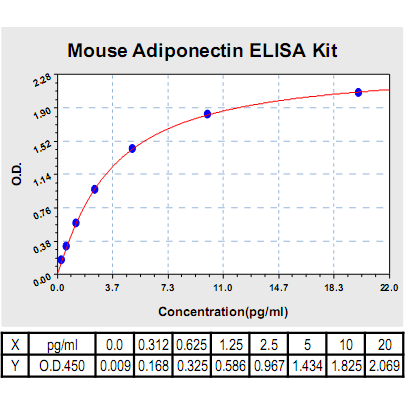Adiponectin ELISA Kit, Mouse |
 |
BACKGROUND Adiponectin is an important adipokine involved in metabolic and hormonal processes. It is expressed in adipose tissue exclusively. It shares similarity to collagens X and VIII and complement factor C1q and circulates in the plasma. It plays important role in the control of fat metabolism and insulin sensitivity, with direct anti-diabetic, anti-atherogenic and anti-inflammatory activities.1 It stimulates AMPK phosphorylation and activation in the liver and the skeletal muscle, enhancing glucose utilization and fatty-acid combustion. Antagonizes TNF-alpha by negatively regulating its expression in various tissues such as liver and macrophages, and also by counteracting its effects. Moreover, it Inhibits endothelial NF-kappa-B signaling through a cAMP-dependent pathway.2 In addition, adiponectin may participate in regulation of cell growth, angiogenesis and tissue remodeling by binding and sequestering various growth factors with distinct binding affinities, depending on the type of complex formed by multimeric adiponectin proteins ( LMW, MMW or HMW).3
REFERENCES
1. Nakano, Y. et aL: J. Biochem. 120:803-812, 1996
2. Ouchi, N. et al: Circulation 102:1296-1301, 2000
3. Wang, Y. et al: J. Biol. Chem. 280:18341-7, 2005
2. Ouchi, N. et al: Circulation 102:1296-1301, 2000
3. Wang, Y. et al: J. Biol. Chem. 280:18341-7, 2005
Products are for research use only. They are not intended for human, animal, or diagnostic applications.
Параметры
Cat.No.: | CL0596 |
Target Protein Species: | Mouse |
Range: | 0.312ng/ml-20ng/ml |
Specificity: | No detectable cross-reactivity with any other cytokine. |
Storage: | Store at 4°C. Use within 6 months. |
ELISA Kits are based on standard sandwich enzyme-linked immunosorbent assay technology. Freshly prepared standards, samples, and solutions are recommended for best results.
Документы
Информация представлена исключительно в ознакомительных целях и ни при каких условиях не является публичной офертой








